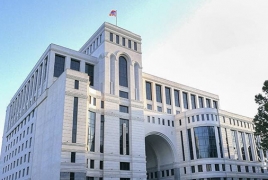Armenia never agreed to any limitation of sovereignty, Yerevan tells Moscow November 10, 2023 - 12:53 AMT PanARMENIAN.Net - Armenia insisted on Thursday, November 9 that it never agreed to Russian “control” of potential transport links between Azerbaijan and its Nakhichevan exclave passing through Armenian territory, rejecting Moscow’s latest claims to the contrary. The Russian Foreign Ministry spokeswoman, Maria Zakharova, provoked a fresh bitter exchange between the two increasingly estranged allies when she seemingly blamed Yerevan for the fact that Russian-brokered agreements to open the Armenian-Azerbaijani border to travel and commerce have still not been implemented, RFE/RL’s Armenian service reports. Zakharova said that a Russian-Armenian-Azerbaijani task force came close to working out all practical modalities of the transport links during over a dozen meetings held in Moscow. The process was not completed because “somebody simply lacks the political will to do this,” she told a news briefing. Zakharova also commented on the recent creation of a special unit of Armenia’s National Security Service (NSS) tasked with ensuring the safe transit of people, goods and other cargo through the country. Citing the ceasefire agreement that stopped the 2020 war in Nagorno-Karabakh, she said that it is Russian border guards that should exercise “control over transport communications” between Nakhichevan and the rest of Azerbaijan. Responding to Zakharova, the Armenian Foreign Ministry spokeswoman, Ani Badalian, said: “Armenia has never, in any document, agreed to any limitation of its sovereignty, and control of a third country cannot be established over any part of its sovereign territory,” Article 9 of the truce agreement stipulates that the Russian border guards stationed in Armenia will “control” the movement of people, vehicles and goods to and from Nakhichevan. Armenia’s Deputy Foreign Minister Vahan Kostanian said earlier this year that this only allows them to “monitor” the commercial traffic, rather than escort it, let alone be involved in border controls. The Azerbaijani government is understood to have demanded that the special transport link for Nakhichevan be exempt from Armenian border controls. Yerevan has repeatedly ruled out that. The main goal of the agreement cited by Zakharova was to stop fighting in Karabakh and prevent new hostilities. It called for the deployment of Russian peacekeepers in Karabakh and gave them control over the Lachin corridor connecting the region to Karabakh. The peacekeepers did not push back when Baku disrupted commercial and humanitarian traffic through the corridor last December and set up a checkpoint there in April in breach of the agreement. Nor did they intervene when the Azerbaijani army went on the offensive in Karabakh on September 19, forcing its practically entire population to flee to Armenia. Unlike the European Union and the United States, Russia did not denounce the offensive. The Armenian Defense Ministry has denied Azerbaijan's accusations of violating the ceasefire. Armenian Prime Minister Nikol Pashinyan took to social media to thank his Lithuanian counterpart for the contribution. President of the Armenian parliament Alen Simonyan met with the Speaker of the Azerbaijani Milli Majlis Sahiba Gafarova. Achieving stable peace between Armenia and Azerbaijan remains a priority of the OSCE, said Ian Borg. Partner news |